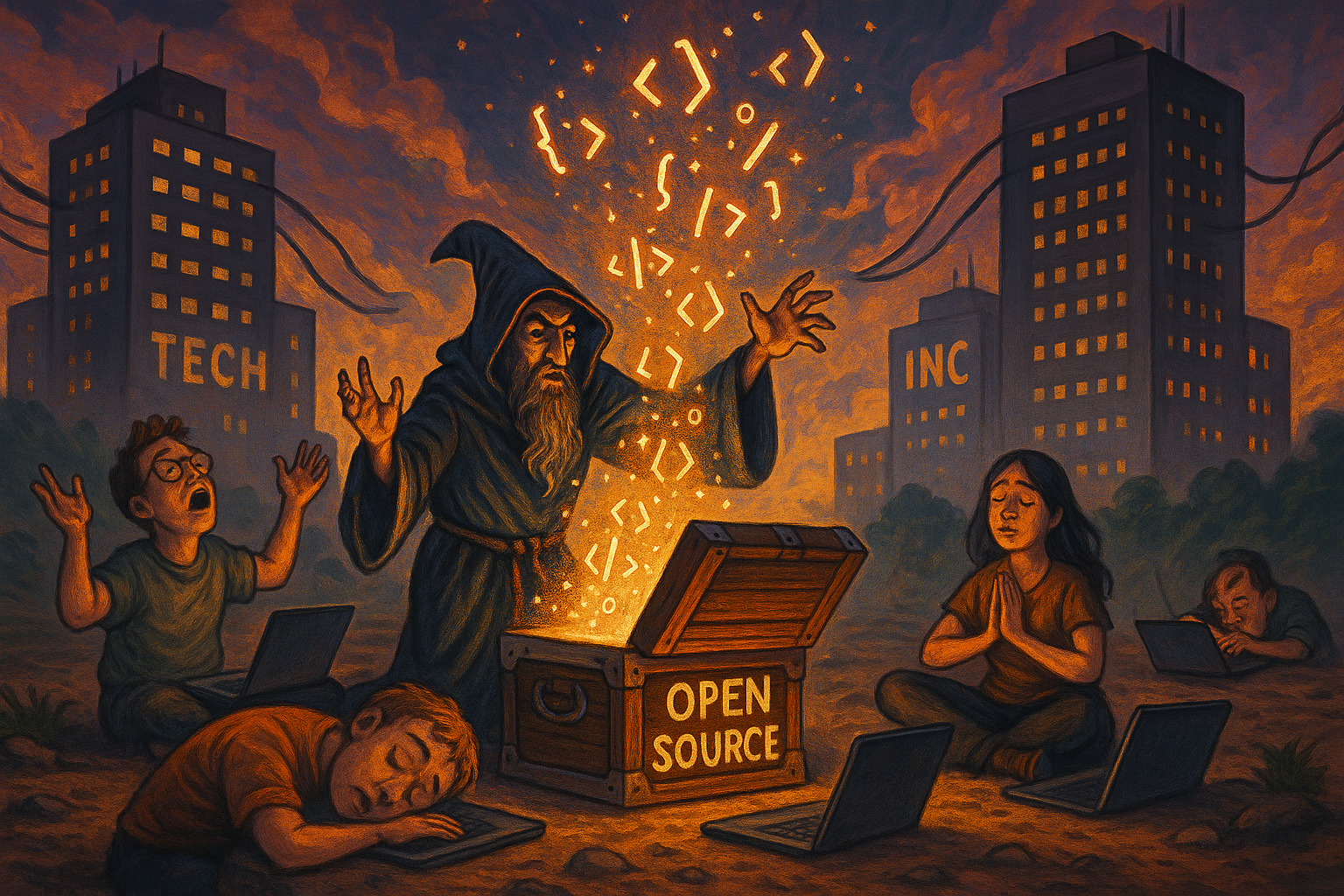Welcome to the Religion of Free Code
Once upon a time, software was built behind closed doors by grown men in suits who charged you $999.99 for an install CD with 3 activations. Then, like a wizard descending from the clouds, open source arrived — whispering sweet promises of freedom, collaboration, and world domination via GitHub PRs.
Fast forward to today: open source isn’t just a model — it’s a culture, a status symbol, a LinkedIn flex, and sometimes, a carefully disguised scam where billion-dollar companies run on code written by unpaid idealists in their pajamas.
So let’s dissect this magical phrase: “Open Source” — the fairy dust that sprinkles credibility on startups, powers Fortune 500 infrastructures, and ensures that your side project repo with 2 stars still makes you feel like Linus Torvalds on a Sunday.
🤝 Collaboration: Where Everyone is a Volunteer, Except the CEO
Open source is where anyone can contribute, which really means: a passionate dev in Eastern Europe fixes a critical bug in your JavaScript package at 3am while the founders of a unicorn startup are asleep, dreaming of their next funding round.
If you thought Robin Hood was cool, wait until you meet “open source maintainers” — modern-day digital monks who:
- Work for free
- Burn out publicly
- And then write emotional Medium posts titled “Why I’m Leaving Open Source”
But don’t worry — someone will fork it and keep the suffering alive.
🧠 Innovation: Build Once, Let Google Use It Forever
The open source model is perfect for innovation. You build something cool. You share it. You blog about it. People love it. Then a FAANG company silently adopts it, uses it at planetary scale, and never sponsors you because they “don’t have the budget.”
Oh, and they might build a closed-source version later — slightly different, slightly better marketed — and eat your market share.
But hey, they’ll thank you in the footnotes of their whitepaper. ✨
⚖️ Licensing: The Most Ignored Legal Thing on Earth
Open source licenses are sacred contracts written by lawyers, designed to protect your work.
Which is hilarious, because:
- 99% of developers don’t read them
- The other 1% just click “MIT” because it “sounds chill”
And let’s not forget the companies that “accidentally” break licenses, only to issue a half-hearted apology buried in their release notes.
Need a TL;DR?
- MIT: Do whatever, but don’t blame me
- GPL: Freedom, but with rules. Like a vegan commune
- Apache: MIT, but with a sprinkle of corporate paranoia
🧘 Burnout and Bragging Rights: The Maintainer’s Dual Life
Maintaining an open source project is a lot like running a nonprofit with no donations and infinite expectations.
- You’ll get GitHub issues from people who didn’t read the README
- You’ll be called lazy if you don’t reply within 24 hours
- And heaven forbid you say “No, I don’t want to implement this feature”
But don’t worry — you’ll still get invited to speak at conferences (unpaid), have your name thrown around in Hacker News comments, and occasionally, get a “thank you” tweet with 4 likes.
💸 Sponsorship: Virtual Tip Jars and the Myth of Financial Freedom
Open source is powered by passion, community, and the faint hope that someone, somewhere, will buy you a coffee.
Enter GitHub Sponsors: a noble system where:
- Indie devs make $12/month
- Libraries used in production by 100k apps are almost breaking even
- Meanwhile, you’re fixing bugs with the intensity of a Netflix engineer, minus the paycheck and stock options
Fun fact: A single Tweet about your repo by a popular dev will get you more dopamine than 6 months of actual sponsorships.
🪄 The Magical Phrase: “It’s Open Source!”
This phrase is tech’s equivalent of a Get Out of Jail Free card. It’s used to justify:
- Lack of documentation
- Half-baked features
- No support
- A complete absence of user empathy
“Oh, it’s broken? Well… it’s open source.”
It’s like handing someone a car with no brakes and saying, “Feel free to modify it yourself!”
🚀 The Upside: Why We Still Love It
Let’s be honest: open source changed the world.
- It empowered solo devs to compete with corporations
- It built the foundation of the modern internet
- It gave rise to Linux, VSCode, React, Python, Node.js, and your 3-star side project that makes your mom proud
For all its flaws, open source remains the greatest force for software democratization the world has ever seen.
It’s chaotic, messy, exhausting — and utterly beautiful.
🎤 Final Thoughts: Worship Wisely
Open source is like fire:
- Used right, it builds communities, sparks innovation, and lights the way forward
- Used wrong, it burns out people, exploits volunteers, and powers billion-dollar empires for free
So next time you say “It’s open source,” ask yourself: Is this a gift to the world, a cry for help, or the beginning of another burnout saga?
Or maybe, just maybe — it’s all three.
